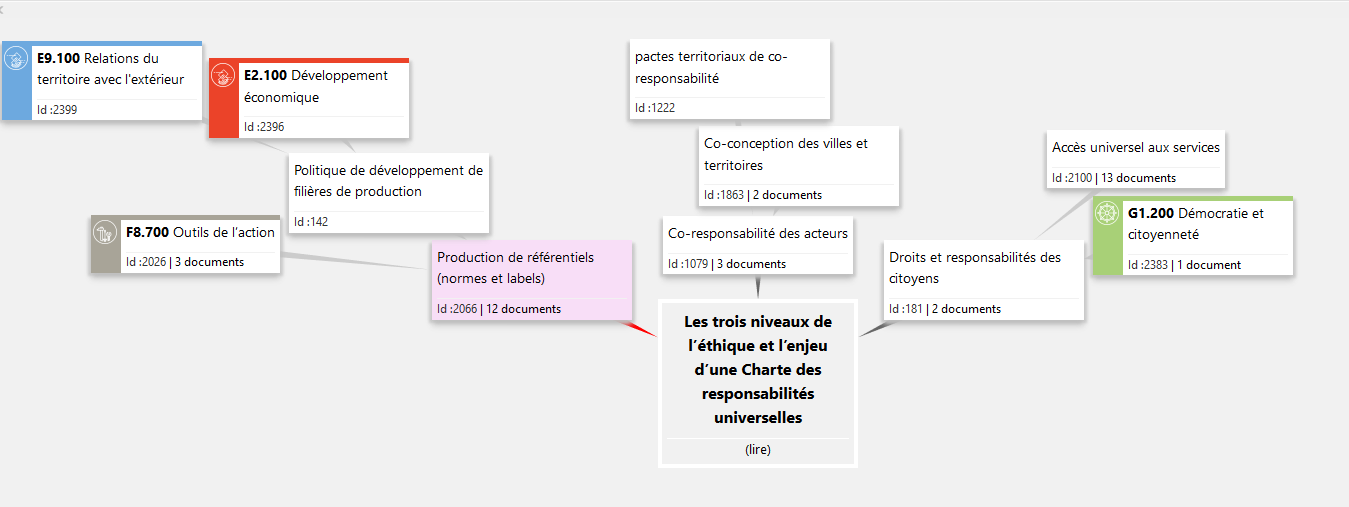The relational atlas as a browsing tool for the website
The relational atlas indexes all the documents (experience records, analyses, proposals, concepts under discussion, etc.) published in the CITEGO document collection.
The relational atlas makes it possible to describe "what a document is about", by emphasizing the links between the descriptors (keywords) and by representing these links. It is distinguished by two aspects of classical keyword indexing: on the one hand, the descriptors address a finer level of detail than thematic keywords and, on the other hand, they are at the interface between other descriptors.
Since descriptors can index several documents, a reader reading one document will immediately see the other documents linked to the same descriptors. He or she will thus be able to delve more deeply into the subject that interests him or her.
At the same time, the display of the semantic field relating to the document consulted will give the reader access to other descriptors and therefore other documents, allowing him to broaden his approach to the problem being dealt with. The relational atlas allows you to navigate according to a neighborhood principle.
The thematic files put online on our site are a privileged way to compare experiences between them and to draw lessons of a more general scope. But all the interest of indexing with the atlas is to embrace the vast semantic field of territories, cities and governance and to show the links between themes.
It is possible to access the relational atlas :
- directly by following the address of the atlas
In this case, navigation is made easier by searching by descriptor in the search bar ;
- you can search for a descriptor in the search bar by using a resource from CITEGO’s fonds as in the example below: Relative documentary resource from session 7 of the Participatory Democracy Mooc: "Participatory Democracy, a rather reassuring failure?!
You can thus access the resources related to your themes of interest (entry by a specific document), identify the main ideas, concepts, interpretations of the document indexed in this document collection and the semantic field associated with these ideas (global view of the descriptors of a document or file) to better select new useful resources in relation to its problematic.
The system of indexing by relationship makes it possible to navigate by "neighbourhood" and thus to have access to resources that would not have been intuitively associated with the content of the resource studied.
Let us take the example of the relative documentary resource from session 7 of the Participatory Democracy Mooc: "Participatory democracy, a rather reassuring failure?! »
In order to deepen the subject, you can click on the tab of the relational atlas.
You then open the dedicated page on the relational atlas website.
This document is indexed by three descriptors: " Citizen initiatives’ contributions to the improvement of participatory democracy processes ", " Citizen evaluation of participatory democracy processes ", and " Development of the "power to act" and empowerment of citizens ".
This dossier allows you to see that participatory democracy can contribute to the development of citizens’ power to act, particularly through citizen evaluation of participatory democracy approaches, but also shows that citizen initiatives contribute to the improvement of participatory democracy approaches. In this sense, the reader can make the connection with citizenship issues by browsing by neighbourhood. Thus, from this navigation appear other concepts attached to it, from the closest to the furthest away.
This navigation may therefore lead you to another large category "Democracy and Citizenship", a category that highlights the importance of the relationship between society (component) and the principles of governance (angle of approach) that underpin territorial governance.
Throughout this navigation, the reader will have access to other documentary resources. For example, the descriptor "rights and responsibilities of citizens" is a theme that interests the reader in relation to his or her subject, particularly with regard to issues of participatory democracy and the power of citizens to act. Two documents are indexed to this descriptor.
By clicking on the chosen document, you will access its indexing, which will allow you to quickly understand what this document is about.
You can read it on the CITEGO website by clicking on "read".


